In honor of the 50th anniversary of both Star Trek and the 1966 Batman TV series, we’ll be spending this final week of 2016 looking at items that relate to one or both of those shows. We conclude with a 1964 pilot that wasn’t picked up for a series, though it was aired as an episode of the anthology Off to See the Wizard in January 1968 due to its stars becoming somewhat more famous in the intervening four years. (Ahem.)
Alexander the Great
Written by Robert Pirosh and William Yates
Directed by Phil Karlson
Original air date: January 26, 1968
The first three title cards tell you everything you need to know: Alexander the Great. Starring William Shatner. Co-starring Adam West. Two years before both men would go on to star in TV shows that would become such a major part of the pop-culture landscape that some long-haired hippie weirdo freak would be writing about them every week for a web site, they starred in this pilot for a sword-and-sandal epic.
As you can imagine, the aforementioned pop-culture landscape would have been a lot different if these two were too busy starring in the Alexander the Great TV show to appear in either Star Trek or Batman.
So what are we to make of this gem, which also guest stars John Cassavetes and Joseph Cotten? Well, let’s take a look…
We open in Persia, under the brutal rule of King Darius, a land of war—of “barbaric war,” our narrator emphasizes, as if there’s another kind. Coming from Greece to bring peace (oh, yeah, totally) is a man named—
A soldier who has just found a bunch of corpses strung up by their feet cries out, “ALEXANDER!” and we cut to Shatner riding bareback and looking determined—and sweaty. Alexander orders the bodies to be cut down—and one of them is alive! He lasts long enough to tell Alexander that Cleander, Alexander’s best friend, was captured and the Persians killed the rest of them and strung them up.
Alexander waxes rhapsodic about how barbaric the Persians are. Then the Persians ambush them. Alexander rides off to save Cleander, who is like a brother to him, even though there are only about half a dozen of them. Alexander singlehandedly cuts down the Persians with his sword, and finds Cleander (West) beaten and bound to a horse.
Before Cleander can give a proper report, they’re surrounded by dozens of Persians on a hill with bows and arrows. They ride off and get attacked.
We cut back to Alexander’s headquarters where his subordinates are trying to figure out where Alexander is. They have a Persian prisoner, an officer who assures them that the Persians are gathering massive forces. But Antigonus (Cotten) is reluctant to withdraw until they find Alexander.
A soldier reports to Memnon that Alexander is dead, though he’s skeptical until someone brings him Alexander’s head. There is mention of a Greek spy for Darius.
Meanwhile, Alexander’s horse rides into camp, covered in days-old blood. Everyone is sure that he’s dead—his Persian hostage Princess Ada, who loves Alexander (yay, Stockholm Syndrome!) wants to kill herself, but Antigonus stops her. She’s free now.
Antigonus refuses to take over the army in Alexander’s place—he’s too old—so he suggests the much younger Karonos (Cassavetes), who reluctantly accepts. He intends to build fortress cities along the coast to fortify Greece’s position and leave Persia to the Persians, moving no further east. They must retreat and return to Greece.
Aristander wants to take a thousand men to find Alexander’s body, which Karonos refuses to allow. They’re about to come to blows, when Alexander and Cleander show up rather unexpectedly. Everyone is thrilled—except maybe Karonos—and Alexander agrees with Karonos’s plan to retreat west.
As Alexander strips down to show off Shatner’s manly manly chest and take a bath, Antigonus rebukes him for going off after Cleander.
The Persian prisoner is freed by an unseen Greek and told to disguise himself as a Greek soldier and kill Alexander.
At dinner, everyone is celebrating, which involves wrestling and laughing and drinking and dancing and stuff. The dancing is provided by Ada, who slinks and writhes to the leering enjoyment of all the men.
Alexander then meets with the generals: they will break camp and march as Karonos ordered, but east not west. They’re going to attack Memnon. Karonos thinks they have enough territory, and that Greece is safe. Alexander believes that if they leave Persia alone, they will get stronger and fight another war. Karonos says the men are exhausted and they can’t stop and hold Persia, but Alexander insists that destroying Darius will bring about peace. Memnon is Darius’s best general, and defeating him will cripple Persia. However, Alexander has not actually provided the battle plan.
Alexander, Cleander, and Antigonus then meet in private, where Alexander explains that he believes there to be a traitor in their midst, so he has to keep things close to the vest. Only Alexander and Cleander know the battle plan.
The disguised Persian takes a shot at Alexander, but misses. We find out that Karonos is the traitor, but he kills the Persian to make things look good for Alexander. However, the arrow the Persian used was Greek. Alexander is now more sure than ever that there is a traitor.
The next day, they march east, a cart falls over, and they have to put it back with their manly manly muscles. Karonos, we learn, has an agreement with Memnon that there will be peace as long as the Greeks retreat. So he has to take another shot at killing Alexander. On the third night, Alexander reveals that they attack at dawn, despite the soldiers all being completely exhausted, with supply lines weak. Alexander is sure that the men will follow him—so is Antigonus, but they will follow him to their deaths. Antigonus is unwilling to accept responsibility for that, so Alexander sends him to the rear to make sure the supply train is firm.
We cut to some soldiers, who are not at all happy about having to attack at dawn, just as Antigonus predicted. But they are also loyal to Alexander.
Antigonus learns that there is a conspiracy afoot to kill Alexander—Karonos isn’t the only one, he’s just the ringleader. They recruit Antigonus, fresh off his argument with Alexander. Karonos gives Antigonus a Persian dagger with which to kill Alexander. They can say he died in battle, bring him home to a warrior’s funeral, and then there will be peace. However, Antigonus was only pretending to be recruited, and he and Karonos get into a knife fight, which Karonos wins, stabbing Antigonus twice in the chest.
After Karonos rides off, Antigonus writes Karonos’s name in the sand as he dies.
Memnon is rather shocked to learn that the Greek army, which was a week away three days ago, is at his gates. But as far as Memnon’s concerned, Alexander has saved him a dusty march. He musters his forces while Alexander sets up catapults and bows on the high ground with lancers and cavalry on the ground. The Persians can only come in via a narrow passageway, and he plans to pick them off when they’re squeezed in.
The battle is joined. Karonos realizes that his plan has failed, that he loved Alexander too much to kill him himself, so he entrusted others, which was his mistake. Meanwhile, Antigonus’s body is discovered—as is the note he left in the sand. Alexander is livid, and he screams Karonos’s name and rides into battle. Even as the battle rages around them, Alexander and Karonos get into a swordfight.
Naturally, Alexander is victorious (both in general against the Persians and in particular against Karonos), because this is a pilot for Alexander the Great, not Memnon of Persia. Memnon retreats, leaving hundreds of corpses on the battlefield. Alexander looks over the bodies and looks either wistful or constipated, it’s hard to tell.
And thus ends Alexander the Great‘s pilot episode for a series that never happened. No doubt it would have continued to detail Alexander’s conquering of Persia. This story is very very very loosely based on the Battle of the Granicus, though it only bears a vague structural resemblance to history. For one thing, all the other characters save for Memnon are pretty much made up whole cloth.
There are good things to say about this production. While his role is miniscule for someone who’s second-billed, Adam West makes the most of his minimal screen time, showing a relaxed charm that’s actually much more entertaining than his square straight man persona on Batman. And the battle scenes are impressively choreographed and staged, with tons of extras and lots of horseplay and such. (If this did go to series, it was bound to be the most expensive TV show on the air, especially if they were going to continue with Alexander’s conquering of Asia Minor.) And I like the fact that the soldiers get dirty and sweaty, and you see beard growth on them after three days of forced marching. The consequences of war are refreshingly not soft-pedaled.
But overall, it’s a pretty bog-standard betrayal-in-war story, where you can see the numbers by which the whole thing is painstakingly painted. Every beat is so utterly predictable as to be stultifying.
Worse, though, is that I watch and find myself on Karonos’s side. Alexander’s insistence on plunging forward into a war with Darius in order to achieve peace is, frankly, lunacy, and is the reason why he’s standing over a lot of corpses at the end. Shatner tries very hard to make Alexander noble and patriotic, but he’s not at all convincing. It’s a very superficial performance, though he’s not alone in that. The great Joseph Cotten does surprisingly little to make Antigonus interesting, John Cassavetes has no charisma as Karonos, and the less said about Ziva Rodann’s Ada the better.
All in all, I’d say the parallel universe where this was made into a series isn’t one I wish to live in. It probably wouldn’t have been that big a deal, and it would have denied us—and Shatner and West—greatness.
Warp factor Bat- Sword-and-sandal rating: 3
Thus endeth our look at the ancillary bits of Trek and Bat-lore as the sun sets on both shows’ 50th anniversary. It’s back to business as usual once 2017 commences with the animated Trek episode “The Survivor” on Tuesday the 3rd and the Bat-episode “Louie the Lilac” on Friday the 6th. I hope you’ve all had a wonderful holiday and I wish us all a safe and healthy and peaceful new year.
Keith R.A. DeCandido‘s latest release is the Super City Cops novella Avenging Amethyst, from which you can read an excerpt right here on this site. This is the first of three novellas about police in a city filled with costumed heroes and villains published by Bastei Entertainment. Full information, including the cover, promo copy, ordering links, and another excerpt can be found on Keith’s blog. The next two novellas, Undercover Blues and Secret Identities, will be released in January and February.










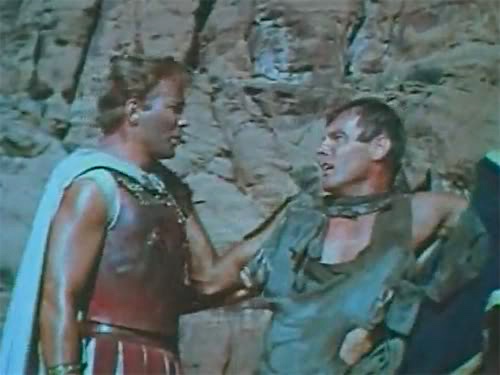
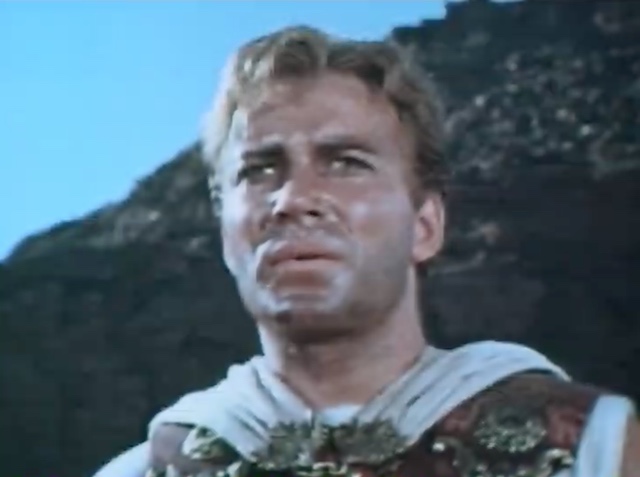
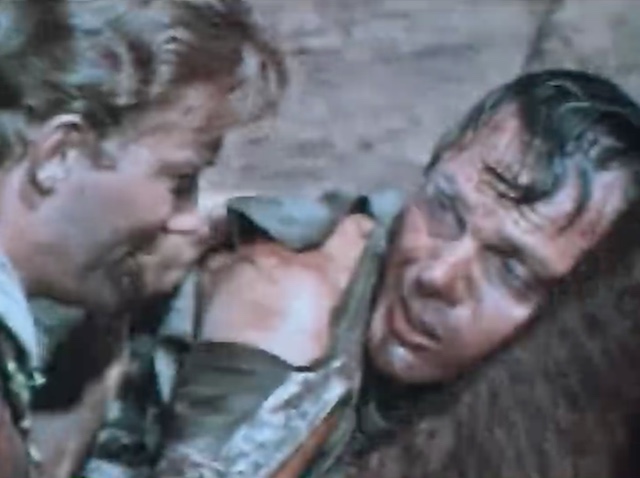
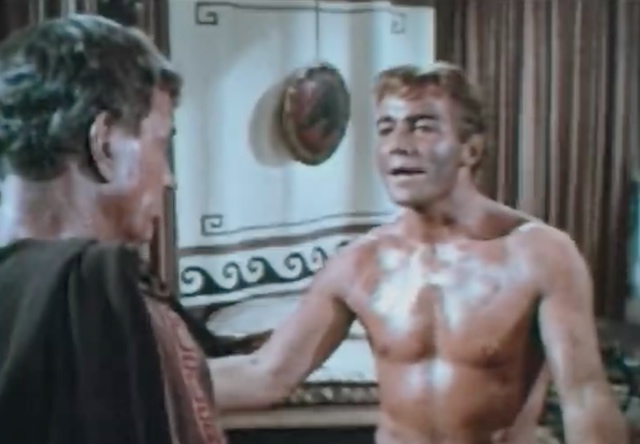
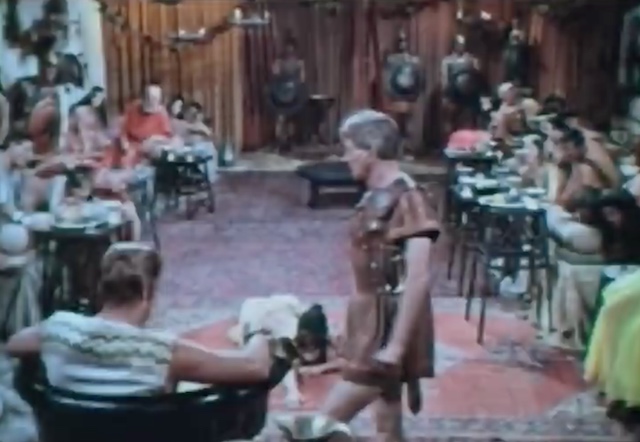
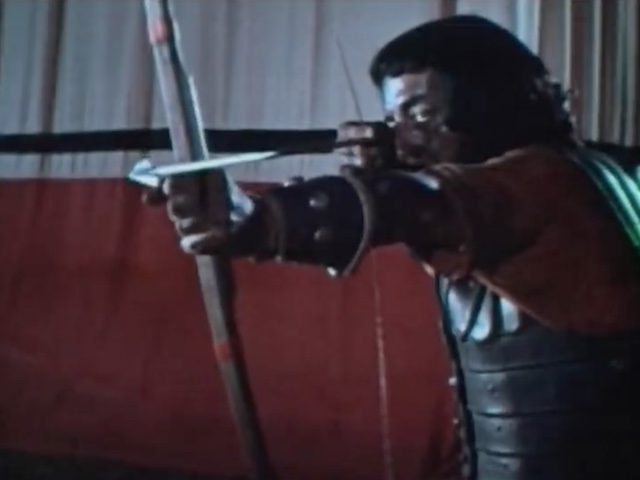
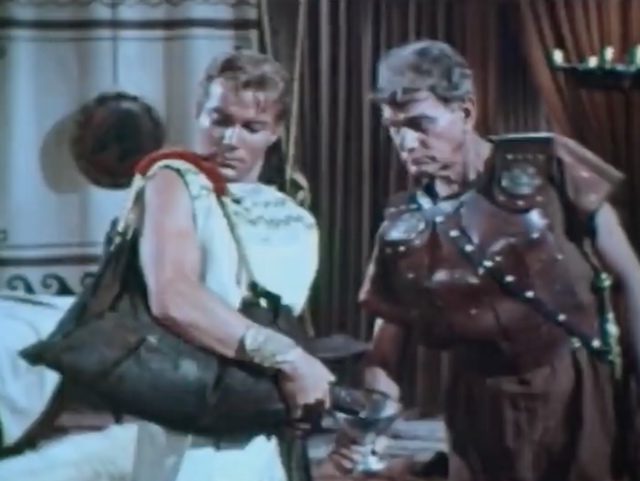
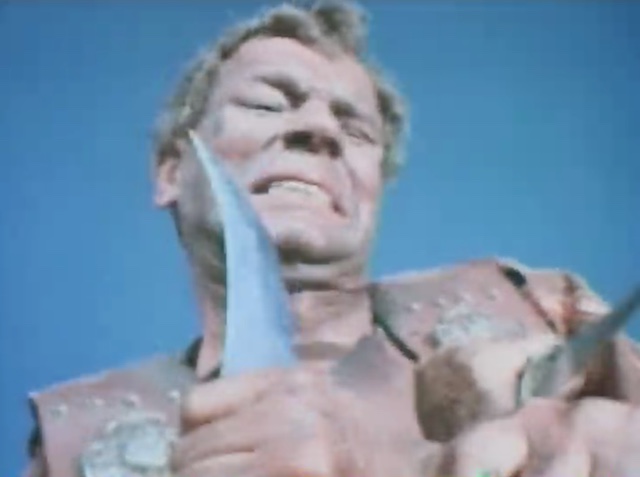
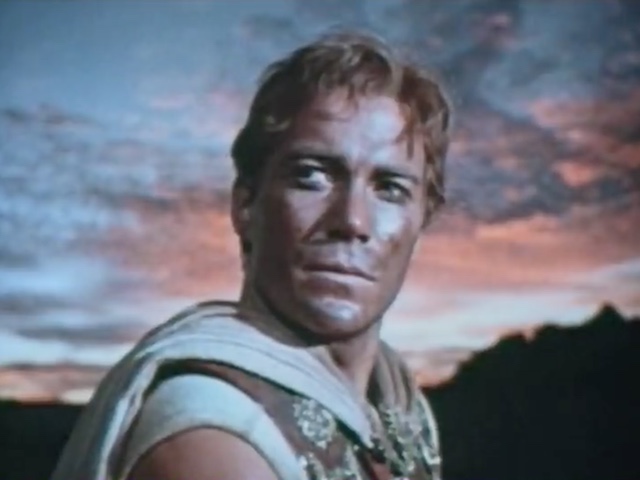
I’ve said it before — Adam West could’ve been a terrific leading man, but his problem was that Batman‘s producers hired him to overact, and he did such a brilliant job of doing exactly what was asked of him that people ended up with the impression that he was a bad actor.
A few references to what the Persians had done when attempting to conquer Greece might have made Alexander’s determination to fight more sympathetic. Some references to Marathon, the desperate defense of Athens, the 300 Spartans holding off an invasion force, the prophecy at Delphi leading to the sea battle where the Persians were defeated, and so on could have gone a long way.
Wow! Looks like outtakes from “Bread and Circuses”. When Alexander shouts Karonos’ name, is there foreshadowing of a certain scene from the second Trek movie?
I’ve probably said it before, but I’ve always wondered about an alternate universe where West got the gig on Trek and Shatner ended up as the Caped Crusader.
So is the Persian would-be assassin disguised as a Klingon?
Wow. I haven’t thought of OFF TO SEE THE WIZARD in years. As I recall, it was an anthology show, hosted by animated versions of the Oz characters, that mostly showed family films like “Zebra in the Kitchen.” Kind of a knockoff of “The Wonderful World of Disney” TV series.
I dimly recall watching it as a kid, but have no memories of ALEXANDER THE GREAT. Must have missed that week.
John Ruschmeyer@3 probably noted this, but that set in the fifth frame looks exactly like the one in which Kirk and Drusilla spend a bit of time eating grapes, and in which Kirk and the proconsul have their conversation; I can’t imagine it’s not, in fact, the same set, right down to the hanging candelabras.
@6/NomadUK: It’s not the same set, since this was an MGM pilot and Star Trek was from Paramount. Rather, both sets drew on standard trappings and props from previous historical films set in Classical Greece and Rome.
And really, they don’t look much alike at all aside from the draperies and candelabras; this seems to be a large furnished tent, while the B&C set was a building interior with solid walls and columns.
Ellen: That might have helped, yeah. :)
—Keith R.A. DeCandido
If only they’d given Adam West pointed ears….
@3 – Now I’ve got various scenes from the 60’s Batman playing in my head starring Shatner. Thanks! :
By the way, West and Shatner are reuniting soon. They’re making a sequel to the animated Batman ’66 revival movie The Return of the Caped Crusaders, with Adam West and Burt Ward reprising Batman and Robin, and Shatner is doing the voice of Two-Face (a character who never appeared in the show, although Harlan Ellison did a story outline for an unproduced Two-Face episode). The character design for Two-Face will also be based on late-’60s Shatner. (By the way, that link claims that Clint Eastwood was slated to play Two-Face in the Ellison episode, but that’s inaccurate; at most, he was under consideration as a candidate. Since the episode never got past the proposal stage, there wouldn’t have been any actual castig done.)
I wouldn’t want to live in the universe where this got picked up as a series, either.
Here’s an interview with Shatner and West talking about the pilot:
http://herocomplex.latimes.com/tv/william-shatner-and-adam-west-reflect-on-their-toga-days/
According to West, Alexander and Cleander were supposed to alternate episodes as the central character, sort of like James Garner and Jack Kelly in Maverick. In that case, they used alternating leads so they could have two units shooting in parallel and meet the show’s production schedule. Given what an elaborate production Alexander would’ve been, I imagine they would’ve benefitted from doing the same. So that explains why West had such a small role here despite being second-billed — he would’ve had a more central role in the second episode, and every other episode thereafter. Although I doubt it would’ve been exactly like Maverick, since the brothers there were completely interchangeable, differentiated only by the actors’ performance, and scripts were written before it was known which lead they’d be assigned to. I don’t think that would’ve worked here, since Cleander wouldn’t have been on the same level of leadership as Alexander, so there would’ve been different dynamics to their stories.
I decided to rewatch this on YouTube (I’d only seen it previously as part of the Mystery Trekkie Theater event at the Shore Leave convention, so I didn’t hear the dialogue very well), and here are some further thoughts…
The credits are substituting capital sigma for capital E. So it’s basically saying “ALSXANDSR THE GRSAT Starring WILLIAM SHATNSR.” I hate it when credits do that. (This also happens a lot with Cyrillic letters.)
So… Right off the bat, we see that Alexander considers his enemies soulless and himself divinely protected. He’s also excessively cocky, childish, and petulant, he pushes his army relentlessly, and he won’t tolerate less than the annihilation of his enemies. This is the guy we’re supposed to see as a champion of light and peace? Keith is right — it’s easier to sympathize with Karonos.
So Memnon’s messenger left before confirming that the deathtrap killed its intended target? He’d fit right in on Batman!
Hey, Attalos is Simon Oakland. “Kolchak!!! You were supposed to have that battle plan on my desk two days ago!!!” Actually, it’s surprising how many of these Greek generals have New York accents.
Bonus Trek connection: The music is by Leonard Rosenman, who would later score Star Trek IV: The Voyage Home. The theme music to both is actually slightly similar.
@14/Christopher: While I wouldn’t rate it alongside the Jerry Goldsmith entries, I find it that Rosenman’s Trek IV score is definitely the most distinctive and playful of them all, with some nice joyful moments as well as some high-powered climactic sequences (best of all, the orchestrated theme for the Enterprise A’s reveal).
This is one score I wish I’d get to hear within a proper movie theater, given that I only got to see the earlier films on VHS/DVD/Blu-Ray. Generations is the first one I saw on the big screen.
I first saw this pilot episode when I was about six. I’d already seen, and become a fan of, Star Trek, so for the first twenty minutes or so after William Shatner appeared, I firmly believed that he was Captain Kirk pretending to be Alexander, and the Real Alexander would turn up later on.
Seeing a clip more recently, it amused me that only William Shatner was shown actually mounting a horse (other riders mounted off camera, because no stirrups), and how much some of it resembled cowboy series of the time – like the Persians appearing on the horizon just like the Indians used to.
Clearly somebody on the writing staff knew their history then; with the possible exception of ‘childish’ every one of those traits tallies with the historic Alexander III of Macedon (and I have to say that Mr Shatner at least LOOKS fairly convincing in the role, though not having seen the episode one cannot speak for the rest of his performance).
Still absolutely delighted Mr West & Mr Shatner got STAR TREK & BATMAN ’66 though.